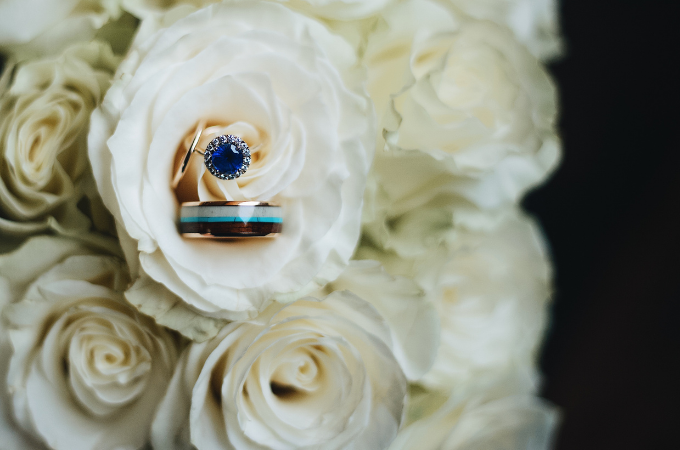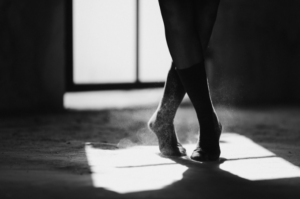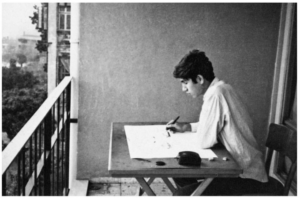
This essay is a rejoinder to Stella’s Nyanzi’s #ReflectingLove essay “Prison Test,” which was published on Valentine’s Day and described her then-partner David’s romantic visit during her prison sentence in Uganda. This piece looks at another Valentine’s Day that David spent with Phil and his partner, vulnerably exploring the complex romantic lives of lovers struggling for revolution.
Phil, who has published interviews and articles on Stella’s resistance for Waging Nonviolence, is also friends with both Stella and David. His partner also has both close and political relationships with them.
***
The marriage record of organizers is with rare exception disastrous. Further, the tensions, the hours, the home situation, and the opportunities, do not argue for fidelity. Also, with rare exception, I have not known really competent organizers who were concerned about celibacy… for life is for [them] a search for… an order in the chaos about us, for a meaning to the life around [them] and its relationship to [their] own life—and the search never ends.
—
Saul Alinsky, Rules for Radicals
David had barricaded his body and his heart into a vacant room for three days. When I realized I couldn’t get through, I handed over the Netflix account and wished him well. I could empathize, after all, with depressive withdrawal. Now I could feel the ring snuggling my left leg. You were in the back, staring down into your phone and chit-chatting with him.
One only lets a loved one like him retreat into himself for so long. It was Valentine’s Day, and as atonement for the recent months I’d spent in the trenches with David and his comrades, I was going against every natural instinct to give you the cheesiest day I could conjure: carmine long-sleeve, silky black necktie, faded burgundy trousers.
In the second verse of my first song, I decided to postpone my second proposal. There was hardly an audience, and you seemed too embarrassed by your human Hallmark card to look up with any shameless admiration. I remembered the first time I played my handmade Spanish nylon-string for you. You leaned back into the only window of our rental and whispered, “Keep playing. It’s taking me places.”
At least we got a free meal. David looked happy to be outside and with company other than the usual tag-alongs leveraging the proximity of his political fame.
David hated me when he first met me upcountry. But a week of grassroots resistance training made him feel alive. I had never heard a more self-assured voice fill the skies when we simulated the military attacks on unarmed students in his dormitory. He was a man with resolve whom I’d be confident to follow. Before leaving, he affectionately told his fellow university students, “I’ve come to learn that although he is a white man, he does have a black heart.” When the lockdown began sometime later, I rode my bicycle some forty kilometers to check on him — not far from where Stella had been imprisoned for over a year.
I liked visiting her too. I enjoyed wooing guards with charisma in exchange for a few minutes of conversation with Stella. I had never met anyone quite like her. She lived to elicit a reaction from those she provoked — friends and enemies alike. She was refreshingly intellectual, unapologetically expressive, and loving and generous with everyone around her, including her captors — until they crossed her lines, of course, and she would throw a chair through a glass cabinet.
Our friendship formed while Stella was held at Luzira, so much so that when I stubbornly walked to her gate when the guards refused to let her see me, she switched on her wrathful persona and earned herself an extended sentence. She stood up for my right to visit. My chronically-pained spine appreciated this, especially after meandering through the hell of traffic and equatorial heat that is a Kampala weekday.
I loved David and Stella and you for the same reason: I could see your struggles. I understood your plights and ambitions, your willingness to look the devil straight in the eyes to overcome him. You were among a small handful living under Museveni’s dictatorship who despised the pervasive culture of willful denialism. This alone meant you all had some degree of an implicit understanding of me. Your revolutionism expressed differently, but all were cut from the same cloth: love. Love for meaning. Love for the proletariat. Love for the queer and eccentric. Love for utopian delight. And although, like me, you wouldn’t admit it: love for yourselves.
Ring still in pocket and performance concluded, I wondered how I could salvage this romantic gesture. I redirected you and David to a place along the lake. We ordered desserts first. I harnessed the same feigned charisma I’d taken to Luzira to coax the bartender into borrowing his hat and apron.
“Film this with my phone, David.” It was one of the few blue-skies smiles he’d offered all week. I interrupted everyone’s romantic dinner and got on one knee, serving you a blue virgin cocktail to match the Tanzanite stone. You said yes, and people clapped.
It was the clapping I hoped you’d experience — that shy-but-eager moment of a world completely unbeknownst offering collective momentary delight.
Perhaps it felt more like a mischievous inside joke to derail the rest of the corporate ladder-climbers and ruling party tycoons in our midst, something to spark a dispute between shallow or noncommittal partners — or at least, those shallower and more noncommittal than me. Maybe that’s not a high bar against someone who divorced in their twenties.
I hope you know I wanted to get an eye-roll. A manufactured dinnertime proposal on Valentine’s Day? Who actually does that? The charm, ideally, was the irony of momentarily assuming that romcom anxious-woman-saving archetype you despite.
If there were any lovers alive to themselves in the room, I’m sure they smirked under their breath after clapping. If there’s one thing I appreciate about having several marital ceremonies in your motherland, it’s the chance to orchestrate something like this more than once.
The proposal I’d made seven months earlier would doubtless remain our truest proposal story. While David used a plastic rose that would never die, I asked that jolly shopkeeper to gather vinca from his hedges — the same ones I’d picked after confessing on our first date that I organized with members of the floriculture union and couldn’t in good conscience buy you the usual bouquet. He sent you on a poetic treasure hunt through Entebbe to the scenic places where we first explored each others’ minds and the dank corridors where we first explored each others’ bodies. At dusk you found me alone on the land we’d scrounged every shilling to purchase. All the words left me. It was the happiest I’d ever cried. You fell to your knees to join me. I was scared and unsure if I was worthy. You were not.
When Stella was out, she reciprocated our jail visits by coming for lunch. Before she could sit down, she wanted to see the potent quilt you had stitched of the names of the Wakiso women fallen to femicide. She remembered it from when you marched together; I was with comrades of South Sudan at the time, probably having my weekly existential crisis. Before we got to the dining table, Stella had offered you her story. Then she announced she was running for Parliament. You would put her to film.
We agreed to putting a baby bump under your wedding dress. It was the self-determined thing to do and the right time to do it. In the post-curfew hours of a militarized pandemic lockdown, we would find our way through the Kampala suburbs to a cheap hotel wherever Stella was that day. “If you want twins,” she advised us, “do as many positions as possible, first quietly and then loudly. First on the bed and then on the floor.”
When the wedding day arrived, there was a baby bump, but no baby.
Days before, the sonographer failed to find a heartbeat. All of the vomiting and hunger pangs and protracted arguments for nothing. When you pushed Rushagatira out, they were undefined, facial features barely beginning to form, the rest of the body disproportionately developed. Neither of us was repulsed. We were flooded with that thing we know in the most nuanced of ways: love.
We packed them into a tender biodegradable box and took them to the land with a jambula tree. I threw a tantrum, and then we buried them with your family and set stones around the roots. We wept.
Stella was supposed to facilitate our vows the next week, but was already in exile in Kenya, now seemingly split with David, who had endorsed her electoral opponent. She continued to love him anyway, and sometimes, against the caution of his partisan supporters, he’d come back to her.
When she was attacked by homophobic Kenyans, Stella returned home with a mango tree and a rosemary bush for our late child’s good company. She sang Christian songs and blushed over not knowing the non-colonial ones while her children set up the badminton net.
When you filmed the armed invasion at Stella’s village home, I held my breath all day. I didn’t want to bury you next to Rushagatira. I assured myself that just like our alchemous periwinkle petals, you knew the life in death better than anyone. Whatever the state of your body, your soul would carry on.
All of your films are about death. Your creations are about death. Our lives, independently and together, are one long dance with death. You are not morbid about death. In walking with it, you transcend death and discover beauty that all others fear to see.
But Stella was not killed like so many of our comrades. She reached safety again and wrote to me from Munich on Valentine’s Day when her ode to David’s romancing was published on Brittle Paper — the same day he announced his precious child born of another woman.
“I am in pain and joy about his new baby. He told me about the child last night. AND yet I still love him dearly…”
We will always have each other, in some way, to lean upon. That kind of love most do not comprehend is capable of thriving in the most desperate of deserts and on the frontlines against fascists. My loves, keep your beating hearts close to this fact. Grace is the element we must wield if we hope to enjoy love ever at all.
I love you, Stella. I revere your always-put-to-action empathy, and hold your broken heart with me. I abhor the isolations you face from those for whom you fight.
I love you, David. I see your dance with death and resonate with its solitudes and your stubborn persistence despite the tribulations. Believing in nothing as those around us do would be infinitely worse.
I love you, kanywani. Unlike plastic roses starkly contrasting the weathered walls of Luzira, periwinkles are unassuming against these fertile tropics and beckon us only when we listen. May you continue to commune with them wherever they’re found, and like Rushagatira, always rise from whatever your own deaths may be and feed your world new life.
Photo by Fallon Michael on Unsplash










COMMENTS -
Reader Interactions